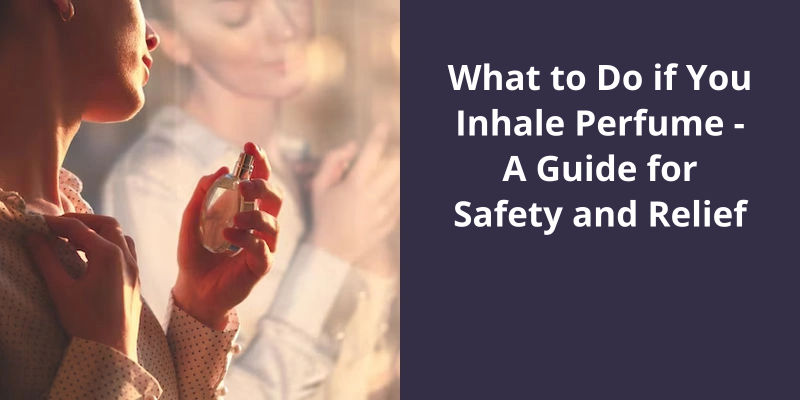If you’ve inhaled perfume, the first thing to do is to get to an area with fresh air and away from the perfume, as fresh air will help clear your lungs. It’s essential to stay calm in order to avoid hyperventilation. However, if coughing or a heavy feeling in the chest persists, or if there are symptoms like dizziness, confusion, or a racing heartbeat, seeking immediate medical attention is paramount. It’s wise to avoid potential triggers, like the perfume you inhaled, in the future as the perfume ingredients could be an irritant or might cause an allergic reaction. Taking small sips of water can help soothe the throat if it feels irritated from coughing, never forgetting that long-term exposure might lead to respiratory problems. Therefore, ensuring well-ventilated spaces when using perfume is prudent.

What Happens if You Inhale a Little Perfume?
When people apply perfume, they typically do so to smell good and boost their confidence. However, inhaling even a little perfume can lead to various negative health effects. Perfumes may contain respiratory sensitizers that trigger wheezing or asthma. People who already suffer from asthma or other respiratory problems are especially susceptible to such reactions.
In addition to respiratory sensitizers, perfumes may also contain hormone sensitizers that throw your endocrine system off balance. These chemicals can mimic the effects of hormones in your body, disrupting your natural balance and leading to a range of health issues. Chemicals in perfumes like phthalates and parabens have been shown to disrupt hormones in animal studies, and it’s likely that they could have similar impacts in humans.
Some perfumes contain secret ingredients that are harmful to your reproductive system when they build up in your body over time. Chemicals like acetaldehyde, benzophenone, and musks are regularly used in perfumes, but they’ve been linked to cancer and other health problems. When these chemicals accumulate in your body, they can harm your reproductive system, causing problems like reduced fertility, developmental issues in offspring, and even cancer.
Some chemicals in perfumes are known to cause headaches, nausea, and other symptoms. These symptoms may be especially pronounced for people who’re sensitive to fragrance or have underlying medical conditions.
If you’re concerned about the ingredients in your perfume, consider switching to natural alternatives or fragrance-free products. Additionally, be aware of the potential health risks of inhaling fragrances and take steps to protect your health.
The Environmental Impact of Perfumes and Their Packaging
Perfumes and their packaging have a significant environmental impact due to the chemicals used in them and the amount of plastic waste they generate. These products often contain harmful ingredients that can release dangerous pollutants into the air and water. Additionally, the packaging materials and production processes for perfumes contribute to the global waste crisis. Therefore, it’s important to consider eco-friendly alternatives when choosing perfumes and to dispose of packaging properly.
It’s not uncommon for people to experience adverse reactions to different scents and fragrances, including perfumes. These reactions can range in severity from mild symptoms like headaches and skin irritation to more serious concerns such as coughing or allergic rhinitis. In this article, we’ll take a closer look at the potential link between perfume allergy and coughing and explore some effective ways to manage and prevent these symptoms.
Can Perfume Allergy Cause Cough?
Perfume is a common cause of allergic reactions, with some individuals showing symptoms of coughing as a result of perfume allergy. These individuals may also experience other symptoms such as headaches, skin irritation, and sneezing, among others.
This is because perfume particles can irritate the lungs, leading to constriction of the airways and difficulty breathing. In severe cases, individuals may experience anaphylaxis, a potentially life-threatening allergic reaction that can cause swelling of the airways and trouble breathing.
It’s important to note that perfume allergies can vary in severity depending on the individual and their sensitivity level. Some individuals may only experience mild symptoms such as a runny nose, while others may experience more severe symptoms such as difficulty breathing.
To prevent symptoms of perfume allergy, individuals can take steps such as avoiding areas with heavy perfume use, choosing perfume-free products, and using air purifiers to filter out airborne irritants. If symptoms persist, it’s important to speak with a healthcare provider to determine the best course of treatment, which may include medications to manage symptoms or immunotherapy to desensitize the immune system to perfume allergens over time.
These symptoms may vary in severity depending on the individual and their sensitivity level. To prevent symptoms, individuals can take steps such as minimizing exposure to perfumes and using air purifiers. If symptoms persist, it’s important to seek medical attention for proper diagnosis and treatment.
Common Triggers of Perfume Allergies: Apart From Perfume, Are There Any Other Common Causes of Perfume Allergies That People Should Be Aware Of?
In addition to perfume, there are several other common causes of perfume allergies that people should be aware of.
Source: Perfume Allergy – News Medical
It’s important to be cautious when using perfume, especially on the face. But, accidents happen. In the event that you accidentally spray perfume on your face, it’s important to know what steps to take to minimize the potential effects.
What Happens if You Accidentally Spray Perfume on Your Face?
In addition to causing irritation and sensitivity, perfume can also cause damage to your eyes if it comes into contact with them.
If you accidentally spray perfume on your face, the first thing you should do is gently wash your skin with cool water and a mild cleanser. This can help to remove any residual fragrance oils and alcohol, which can further irritate your skin. Once your skin is clean, you can apply a soothing moisturizer or healer to help calm the skin and reduce any redness or irritation.
If you experience any severe reactions after accidentally spraying perfume on your face, such as hives, swelling, or difficulty breathing, you should seek medical attention immediately. These can be signs of an allergic reaction, which can be life-threatening if left untreated. Your doctor may prescribe medication to help control your symptoms and prevent further complications.
If you do choose to wear perfume on your face, look for products that are specifically formulated for facial use and contain gentle ingredients that are less likely to cause irritation or sensitivity.
Taking the time to choose gentle, skin-friendly products and applying them properly can help to ensure that you look and feel your best while minimizing the risk of harm to your delicate facial skin.
Common Ingredients in Perfume That Can Cause Skin Irritation or Sensitivity
- Benzyl Salicylate
- Benzyl Alcohol
- Citral
- Cinnamaldehyde
- Eugenol
- Limonene
- Linalool
- Geraniol
- Citronellol
- Farnesol
- Alpha-isomethyl ionone
- Coumarin
- Hexyl cinnamic aldehyde
While perfumes have long been used as a way to freshen breath and combat bad odors, there’s growing concern over the safety of mouth perfume. This is because the scented ingredients in perfume are often infused into toxic alcohols that can cause harm if ingested in large quantities. Read on to learn more about the potential risks of using mouth perfume and what you can do to protect yourself.
Is Mouth Perfume Safe?
While mouth perfumes are commonly used to freshen breath and eliminate bad odor, there’s a growing concern about their safety. According to experts, mouth perfumes can contain a range of synthetic fragrances and alcohol-based ingredients that may cause irritation, dryness, and allergic reactions in some people. In particular, the use of mouth perfumes among children and pregnant women is discouraged due to the potential risks that these products may pose.
One of the main concerns about mouth perfumes is the use of alcohol-based ingredients such as ethanol, isopropanol, and glycerin. These alcohols are used as solvents to help the perfumes fragrances dissolve and spread evenly when applied onto the surface of the mouth. However, these alcohols are toxic, and may cause symptoms such as nausea, vomiting, and dizziness if swallowed in amounts greater than 30 milliliters. Additionally, the high alcohol content can cause dryness and irritation in the mouth, especially when used frequently.
Synthetic fragrances are often cheaper and more widely available than natural essential oils, but they can contain a wide range of chemicals that may be harmful to human health. For example, some synthetic fragrances have been linked to skin irritation, respiratory problems, and even cancer in some studies.
To ensure the safety of these products, it’s important to choose a reputable brand that uses natural or organic ingredients, and avoid using them excessively.
The use of fragrance has become ubiquitous in our society, with a vast array of options available to suit every taste and occasion. However, recent studies have found that wearing perfume or cologne might be harmful to human health, and the long-term effects of chronic exposure to fragrance compounds aren’t well understood. This has led some experts to question whether these scents are potentially as dangerous as smoking cigarettes.
Is Perfume as Bad as a Cigarette?
Perfume and cologne might seem innocent, but the truth is that they’re filled with a range of toxic chemicals that are known to cause harm to our health.
Some of the most common chemicals found in perfumes and colognes include benzene, formaldehyde, styrene, toluene, phthalates, and parabens. These chemicals have been linked to a range of health problems, including headaches, dizziness, respiratory problems, and allergies. They’ve also been linked to more serious health problems such as cancer, infertility, and birth defects.
One of the biggest problems with perfume and cologne is that they’re often used in enclosed spaces like offices, elevators, and airplanes. When people wear these fragrances in confined spaces, they can easily trigger allergic reactions or respiratory problems in others. This is known as “second-hand fragrance” and it’s just as dangerous as second-hand smoke.
What makes perfume and cologne even more dangerous is that they aren’t regulated like other consumer products. In fact, there’s no law in the United States that requires manufacturers to list all the ingredients on the label of a fragrance product. This means that people are often exposed to toxic chemicals without even knowing it.
Alternatives to Traditional Perfume and Cologne, Such as Essential Oils or Natural Fragrances
- Essential oils
- Natural fragrances
- Aromatherapy blends
- Herbal scents
- Citrus oils
- Floral-infused perfumes
- Spice-based fragrances
- Vegan perfumes
- Organic perfumes
- Non-toxic fragrances
Conclusion
Seeking prompt medical attention by calling emergency services or the Poison Help hotline is crucial in preventing further damage and ensuring the best outcome possible. It’s also important to be mindful of potential triggers and to avoid exposing yourself to harmful chemicals whenever possible. Remember, prevention is key when it comes to protecting your health and wellbeing.





